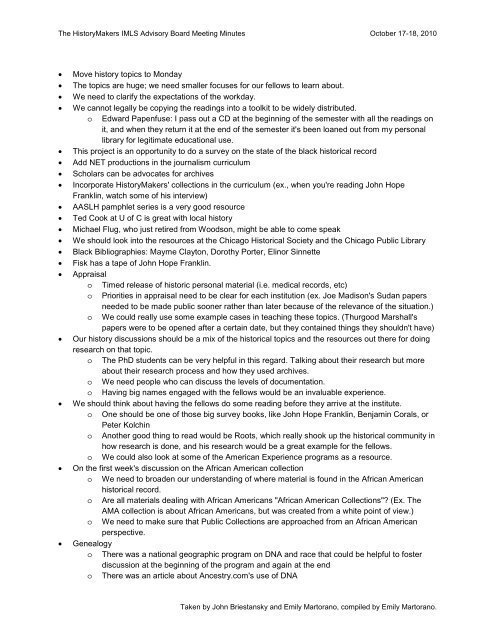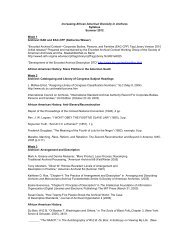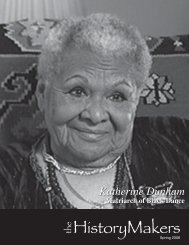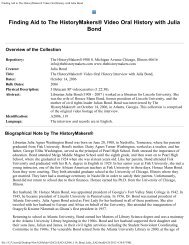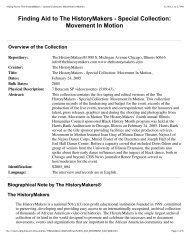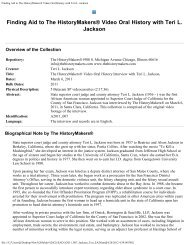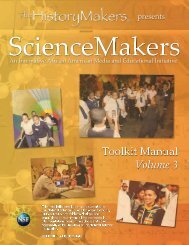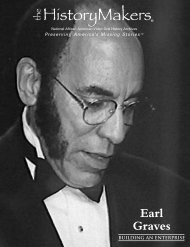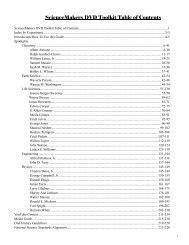Attachment B: Conference Call/Meeting Minutes - The History Makers
Attachment B: Conference Call/Meeting Minutes - The History Makers
Attachment B: Conference Call/Meeting Minutes - The History Makers
You also want an ePaper? Increase the reach of your titles
YUMPU automatically turns print PDFs into web optimized ePapers that Google loves.
<strong>The</strong> <strong>History</strong><strong>Makers</strong> IMLS Advisory Board <strong>Meeting</strong> <strong>Minutes</strong> October 17-18, 2010• Move history topics to Monday• <strong>The</strong> topics are huge; we need smaller focuses for our fellows to learn about.• We need to clarify the expectations of the workday.• We cannot legally be copying the readings into a toolkit to be widely distributed.o Edward Papenfuse: I pass out a CD at the beginning of the semester with all the readings onit, and when they return it at the end of the semester it's been loaned out from my personallibrary for legitimate educational use.• This project is an opportunity to do a survey on the state of the black historical record• Add NET productions in the journalism curriculum• Scholars can be advocates for archives• Incorporate <strong>History</strong><strong>Makers</strong>' collections in the curriculum (ex., when you're reading John HopeFranklin, watch some of his interview)• AASLH pamphlet series is a very good resource• Ted Cook at U of C is great with local history• Michael Flug, who just retired from Woodson, might be able to come speak• We should look into the resources at the Chicago Historical Society and the Chicago Public Library• Black Bibliographies: Mayme Clayton, Dorothy Porter, Elinor Sinnette• Fisk has a tape of John Hope Franklin.• Appraisalo Timed release of historic personal material (i.e. medical records, etc)o Priorities in appraisal need to be clear for each institution (ex. Joe Madison's Sudan papersneeded to be made public sooner rather than later because of the relevance of the situation.)o We could really use some example cases in teaching these topics. (Thurgood Marshall'spapers were to be opened after a certain date, but they contained things they shouldn't have)• Our history discussions should be a mix of the historical topics and the resources out there for doingresearch on that topic.o <strong>The</strong> PhD students can be very helpful in this regard. Talking about their research but moreabout their research process and how they used archives.o We need people who can discuss the levels of documentation.o Having big names engaged with the fellows would be an invaluable experience.• We should think about having the fellows do some reading before they arrive at the institute.o One should be one of those big survey books, like John Hope Franklin, Benjamin Corals, orPeter Kolchino Another good thing to read would be Roots, which really shook up the historical community inhow research is done, and his research would be a great example for the fellows.o We could also look at some of the American Experience programs as a resource.• On the first week's discussion on the African American collectiono We need to broaden our understanding of where material is found in the African Americanhistorical record.o Are all materials dealing with African Americans "African American Collections"? (Ex. <strong>The</strong>AMA collection is about African Americans, but was created from a white point of view.)o We need to make sure that Public Collections are approached from an African Americanperspective.• Genealogyo <strong>The</strong>re was a national geographic program on DNA and race that could be helpful to fosterdiscussion at the beginning of the program and again at the endo <strong>The</strong>re was an article about Ancestry.com's use of DNATaken by John Briestansky and Emily Martorano, compiled by Emily Martorano.


